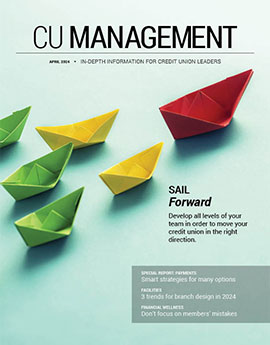3 minutes
Show notes for the CUES Podcast Episode 44
"Costly communication breakdowns often happen on work teams because of simple misunderstandings. If not dealt with, your team can lose forward movement, then productivity and engagement can suffer," says Carla Rieger, a communication expert, author and director of The Artistry of Change Inc., a consulting firm based in Vancouver, British Columbia. We invited her to speak at CUES' 2017 Execu/Summit. Afterwards, she and I had a chance to sit down and chat.
In Episode 44 of the CUES Podcast, Rieger discusses the five modes of communication:
- Competing: I win, you lose.
- Accommodating is the opposite: You win, I lose.
- Avoiding: We both lose.
- Compromise: We partly both win, we partly both lose.
- Collaborating is win/win for all.
"We often hear people say 'We need a win/win outcome; we need to be collaborative,'" she says. "Butut what people don't understand is that collaboration takes a lot of skill and a lot of time. So sometimes it actually makes more sense to communicate in the other modes."
As people say, pick your battles. "Sometimes avoiding a conflict about something that is low stakes is actually the most appropriate communication mode," she adds.
Accommodating might be the best when the goal is very important to the other person and not at all important to you. Parents are familiar with this mode of communication! For example, one of my daughters was consistently refusing to put her pajamas on before going to bed. Instead, she would change into the clothes that she planned to wear the next day and would sleep in those clothes. After many frustrating battles insisting that she wear her pajamas and then also having to deal with her not wanting to get dressed in the morning, we finally gave in and no longer insist that she wear pajamas to bed.
Accommodating is a useful communication technique when the relationship is more important than your goal, explains Rieger.
Compromising can be useful when you don’t have a lot of time.
"But you want to collaborate when the relationship is really important and the goal is important," Rieger says.
The thing you don’t want to do is get stuck in one mode. Some people just accommodate all the time and never get their needs met. Others compete all the time and burn a lot of bridges.
I found this interview personally valuable, and invite you to share this episode with your entire team as Rieger discusses some very action-oriented steps to allow you and your team to be more effective communicators. Some key takeaways include…
- identifying the five modes of communication;
- how to phrase statements to bring out the best in your communication; and
- identifying the qualities of a highly effective communicators.
Listen to my interview with Carla Rieger.
The CUES podcast is an audio program hosted by James Lenz, CUES professional development manager. James talks to credit union and cross-industry experts for their perspectives on trends and topics that matter to you.
Now is a great time to register for Execu/Summit, March 11-16 at the Summit at Big Sky in Big Sky, Mont.










